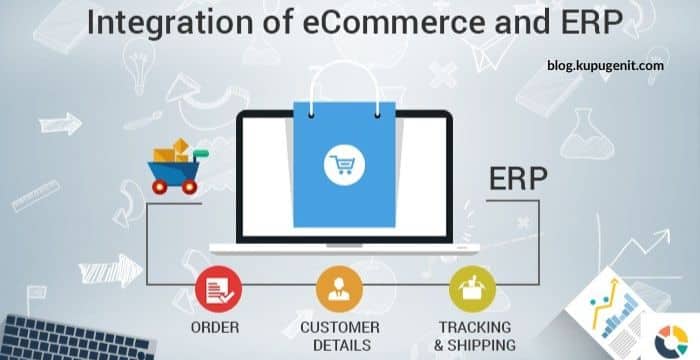blog.kupugenit.com | Erp Ecommerce – As an experienced content writer, I’ve had the privilege of delving into various topics, and one that stands out in the e-commerce realm is the integration of Enterprise Resource Planning (ERP) systems. In this blog post, we’ll explore the potential of ERP solutions and their impact on the dynamic e-commerce industry.

I. Introduction to Ecommerce
A. Explanation of ERP (Enterprise Resource Planning)
ERP is a robust software solution that integrates various business processes into a centralized system. For e-commerce, it means bringing together inventory management, order processing, customer data, and more.
B. Significance of ERP in the e-commerce industry
In the fast-paced world of online retail, efficient operations are paramount. ERP offers a strategic advantage by providing real-time insights and process automation, ultimately driving growth and customer satisfaction.
II. Advantages of Implementing ERP in E-commerce
A. Streamlined Operations and Order Processing
ERP systems optimize workflows, from order placement to fulfillment, reducing errors and speeding up delivery times. This efficiency enhances the customer experience.
B. Improved Inventory Management
Managing inventory is a constant challenge in e-commerce. ERP helps businesses maintain optimal stock levels, preventing overstocking or running out of popular items.
C. Enhanced Customer Relationship Management (CRM)
A central CRM system in ERP allows e-commerce businesses to personalize marketing efforts, respond to customer inquiries promptly, and build lasting relationships.
D. Real-time Analytics and Reporting
ERP provides invaluable data insights, helping e-commerce businesses make informed decisions, identify trends, and adjust strategies swiftly.
III. Key Features of ERP for E-commerce
A. Inventory Management and Order Tracking
Track inventory levels, manage stock across multiple locations, and gain insights into item popularity and reordering needs.
B. Integration with E-commerce Platforms
Seamlessly integrate ERP systems with your chosen e-commerce platform, ensuring data consistency across all channels.
C. Multi-channel Sales Management
ERP enables e-commerce businesses to sell through various channels, from their website to marketplaces like Amazon and eBay.
D. Automated Marketing and Customer Data Analysis
Leverage customer data for targeted marketing campaigns and analyze results to refine your strategies.
IV. ERP Solutions for E-commerce
A. Leading ERP systems for e-commerce businesses
Explore top ERP solutions like NetSuite, SAP Business One, and Microsoft Dynamics 365 that cater to the unique needs of e-commerce.
B. Unique features and benefits of each ERP solution
Delve into the specific strengths of each ERP system to determine which aligns best with your e-commerce goals.
In the e-commerce landscape, staying competitive requires efficient processes and smart technology. ERP systems are the driving force behind many successful online retailers, optimizing operations and helping businesses scale. Join me as we embark on this journey through the world of ERP in e-commerce, uncovering the strategies for e-commerce excellence.
As a dedicated content writer, I’m excited to dive into the next chapters of our exploration of ERP (Enterprise Resource Planning) in the world of e-commerce. In this section, we’ll unravel essential factors to consider when selecting the right ERP solution for your online business, delve into real-world success stories of e-commerce enterprises that have harnessed the power of ERP, peek into the future of ERP trends in the e-commerce landscape, and conclude with an empowering message for entrepreneurs in the digital commerce sphere.
V. Factors to Consider When Selecting ERP for E-commerce
A. Assessing E-commerce Business Needs
Choosing the right ERP starts with a thorough understanding of your e-commerce business. Consider factors like transaction volume, product variety, customer base, and scalability requirements.
B. Budget Considerations
Set a clear budget for ERP implementation and maintenance. It’s essential to balance cost with the potential ROI that an effective ERP system can bring.
C. User-Friendliness and Training
Opt for an ERP solution that your team can easily adopt. Adequate training and support from the ERP vendor are crucial for a smooth transition.
D. Vendor Reputation and Support
Research ERP vendors extensively. Look for those with a proven track record in e-commerce and reliable customer support, as they will be your partners on this journey.
VI. Real-world Success Stories with ERP in E-commerce
A. Examples of E-commerce Businesses Benefiting from ERP
We’ll delve into real stories of e-commerce entrepreneurs who implemented ERP solutions to drive growth, enhance customer experiences, and achieve operational excellence.
B. Challenges They Faced and How ERP Solutions Helped
Learn from the challenges these businesses encountered and discover how ERP systems played a pivotal role in overcoming obstacles.
VII. Future Trends in ERP for E-commerce
A. Emerging Technologies and Their Impact
Stay ahead of the curve by exploring emerging technologies such as AI-driven analytics, blockchain for supply chain transparency, and IoT for inventory management, all poised to transform e-commerce through ERP integration.
B. The Evolving Role of ERP in E-commerce Operations
Gain insights into how ERP systems will evolve to address the ever-changing demands of e-commerce, from improving personalization to enabling faster order fulfillment.
VIII. Conclusion: Revolutionize Your E-commerce Business with ERP
A. Recap of the Value of ERP in E-commerce
Summarizing the tangible benefits of Erp Ecommerce, from streamlined operations to data-driven decision-making, underscoring how it can catalyze your business’s success.
B. Encouragement for E-commerce Entrepreneurs to Explore ERP Solutions
An inspiring message to e-commerce visionaries, urging them to embark on their ERP journey to unlock new possibilities and drive their online businesses to new heights.
IX. FAQs About ERP Ecommerce
A. Addressing Common Questions About ERP for E-commerce Businesses
I’ll provide insights into the most common inquiries regarding ERP implementation, integration, costs, and more, to empower e-commerce entrepreneurs with the knowledge they need to thrive in the digital marketplace.
Join me as we unravel the power of Erp Ecommerce, unveiling strategies, success stories, and the exciting future of digital retail. Your journey to e-commerce excellence continues, and ERP is the key to unlocking its full potential.